Review: GA Ensemble Stages a Spellbinding Twist on a Classic Ghost Story
This eerie adaptation runs through November 14
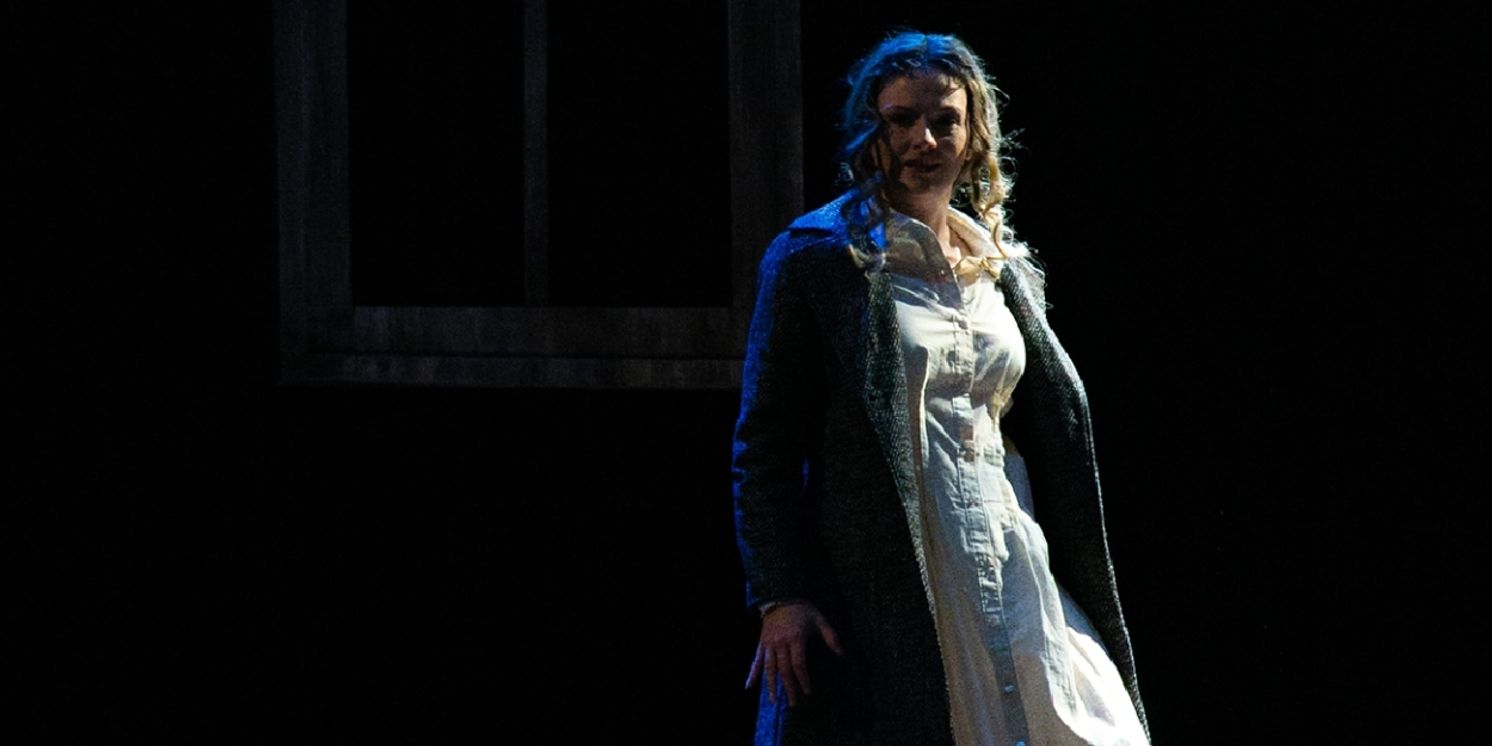
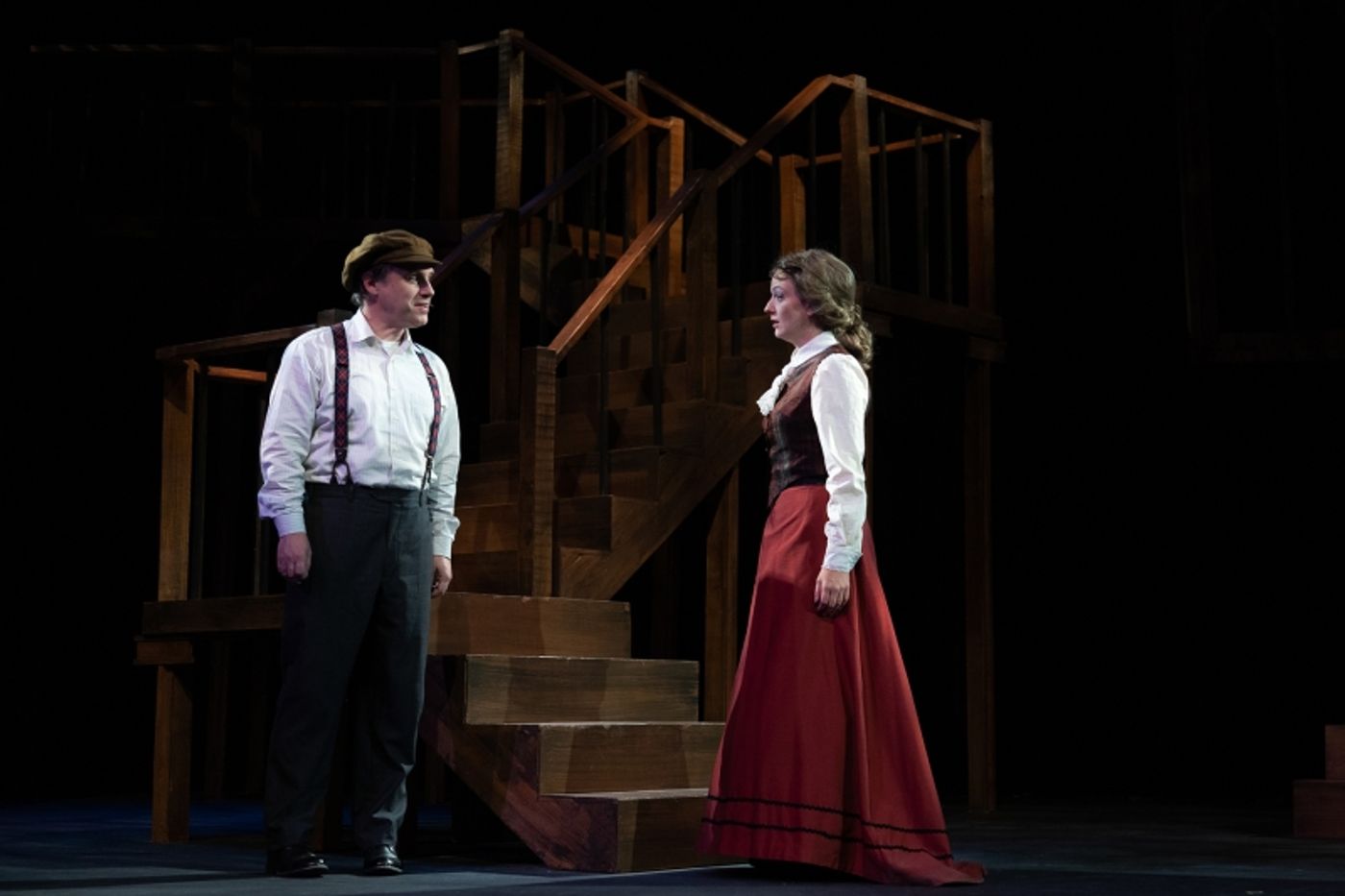
Photography credit: Casey Gardner Ford
Halloween may be in the rearview, but a production of The Turn of the Screw, Henry James's seminal mystery about a governess's encounter with two ghosts who seem to be preying on her young charges, is worth getting excited about at any time of year. The story has haunted readers since its initial publication in 1898, inspiring numerous stage and screen adaptations (including the recent film The Turning, starring Mackenzie Davis and Finn Wolfhard, and the Netflix miniseries The Haunting of Bly Manor, both released in 2020). This adaptation, written by Jeffrey Hatcher, successfully conjures up all the paranoia and anxiety of James's original novella, skillfully amplified by the powerhouse production team of Georgia Ensemble Theatre.
The Turn of the Screw tells the story of a young governess who is hired by a wealthy gentleman to care for his niece and nephew in the secluded country house of Bly Manor. However, as soon as she arrives, she begins to see apparitions of a strange man and woman roaming the grounds. She comes to believe that they are the ghosts of Miss Jessell, her predecessor, and Peter Quint, a former employee and Jessell's sadistic lover, both of whom died under mysterious circumstances. She begins to fear that the ghosts are targeting the children, Miles and Flora, for some sinister purpose, and resolves to find a way to defeat the evil spirits.
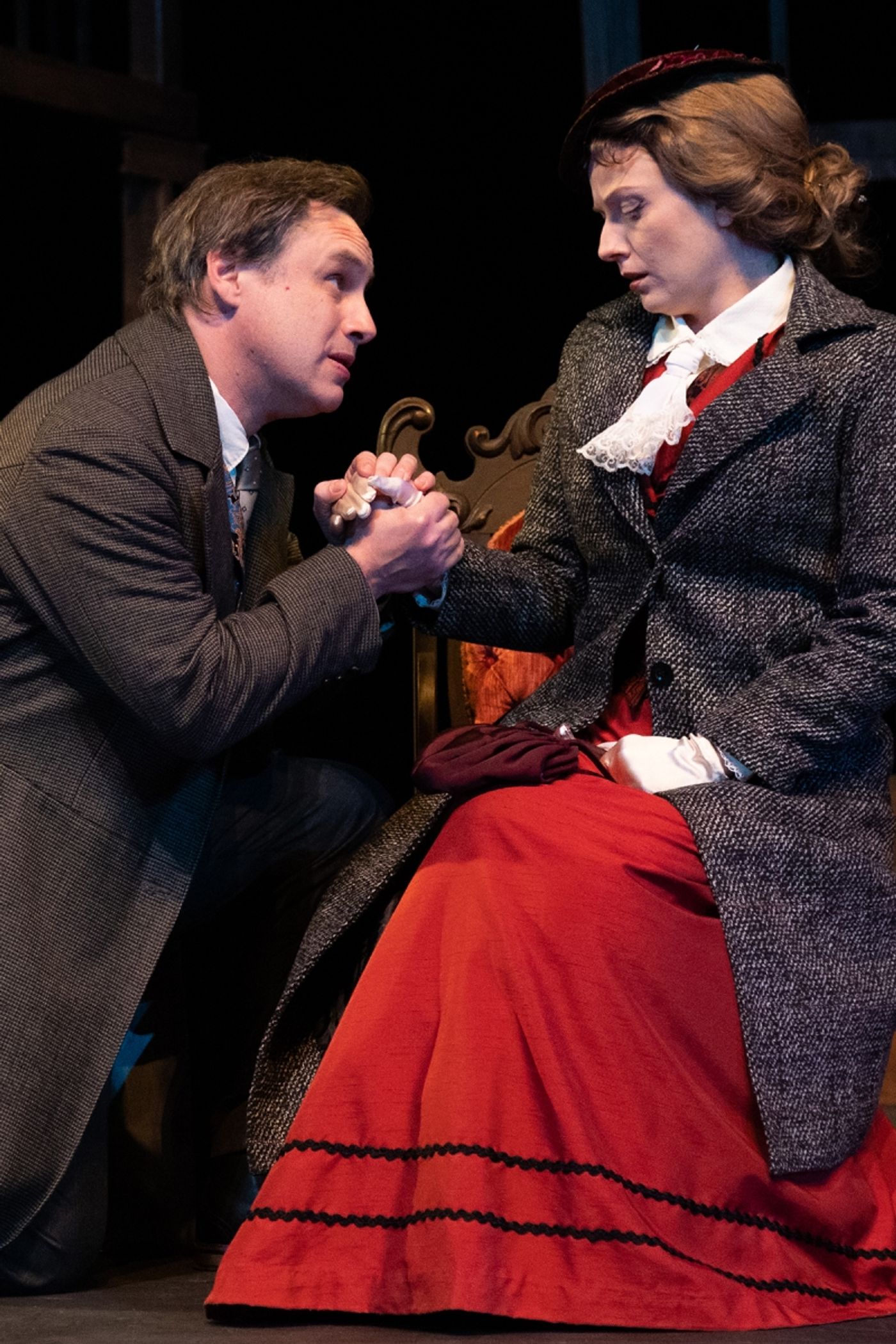
Photography credit: Casey Gardner Ford
However, where James's story thrives is not in jump-scares or in its ambiguity; for starters, we see very little of the antagonistic spirits, there is much question as to precisely how and why they died, and their motives for haunting Bly Manor remain unclear throughout. In revealing so little, James taps into that most frightening of forces: the unknown. The horror of this story is in all of the things that you don't see, and all of the unspeakable scenarios that may emerge from the unchecked imagination.
Director James Donadio taps into that ambiguity by employing staging techniques designed to keep the audience in a state of questioning. Despite featuring five characters, the entire show is performed by only two actors, with Christina Leidel playing the Governess while Daniel Thomas May plays all of the other characters. Scenic designer Jamie Bullins's deconstructed manor features nothing more than a staircase leading to an upper landing, a chair, a lower platform, and what appears to be a stained glass window suspended in midair. All of these choices give the impression of incompleteness. Even before the first ghost appears, we are already living in a heightened state of reality in which everything seems slightly off.
The lighting and sound design, by Elisabeth Cooper and Winston Johnson, respectively, also amplify the surreality of the governess's surroundings. Cooper infuses certain scenes with ominous mood lighting, casting eerie shadows along the walls and floors. Johnson implements strategic echo effects that manage to unnerve without feeling cheesy, while also taking the ambient noises of Bly Manor and twisting them into something unearthly. These effects are at their most present when the governess is alone, making the lights and sounds seem to represent the very walls of Bly itself closing in on her.
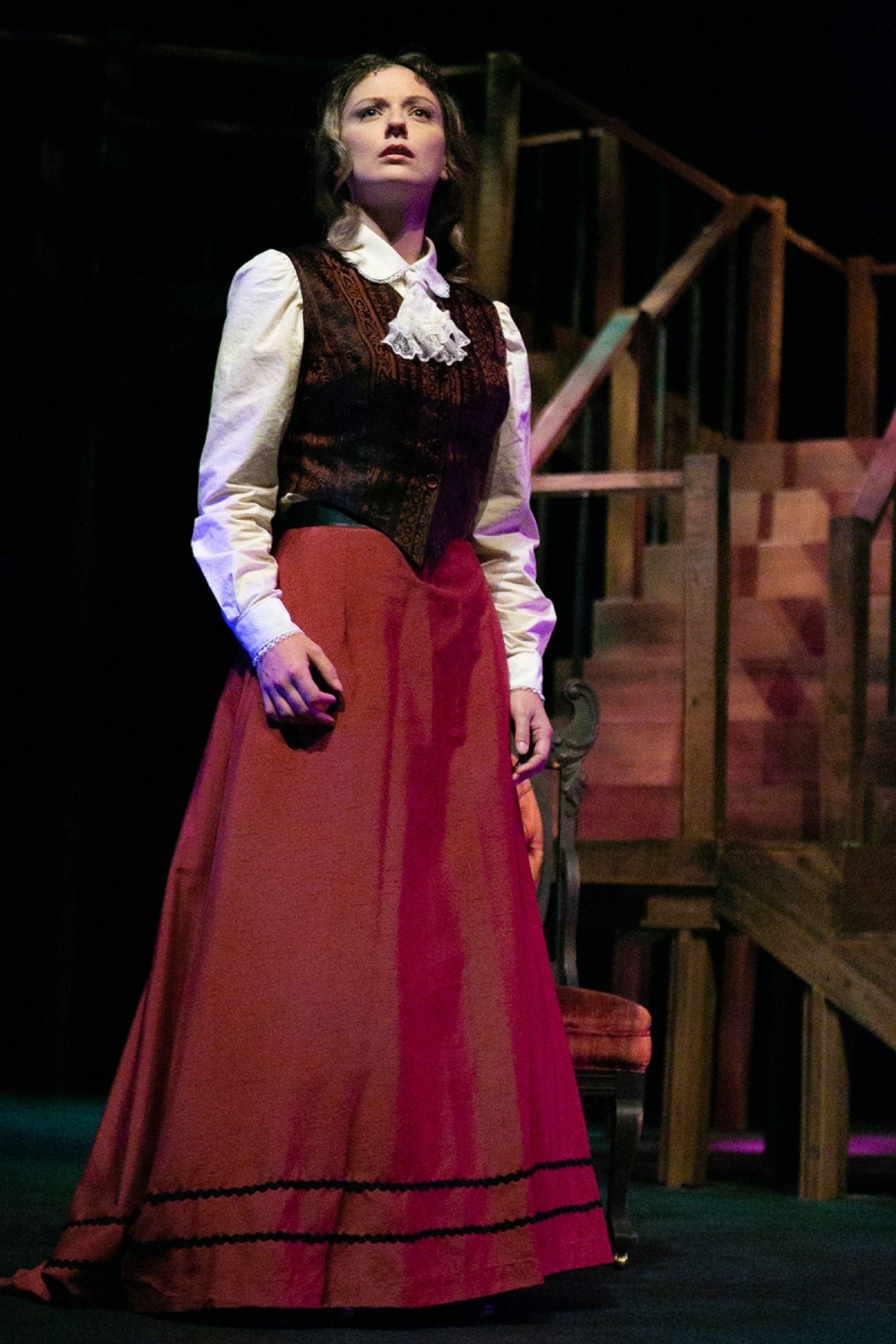
Photography credit: Casey Gardner Ford
Of course, all of these elements primarily serve to support Christina Leidel's tour-de-force performance, without which I doubt this production would be able to retain even half of its hypnotic appeal. Leidel is captivating at every turn, charming in her introduction as a young woman who is eager to please her new employer and connect with her charges. Her optimism is almost infectious, and yet there is something not quite right in her ardent devotion toward children she has just met. From there, her bubbly exterior begins to deteriorate as continuous sightings of Quint and Jessell, compounded with a growing suspicion of Miles and Flora's involvement, begins to eat away at her. Leidel plays this descent with admirable skill, showing every layer of the character's personality with subtlety and nuance, all the while building to a more dramatic breakdown as the beleaguered woman's composure begins to fail.
Daniel Thomas May is similarly excellent in his multiple roles. As the Narrator of the story, he is commanding and eloquent. As Miles and Flora's uncle, he is charming yet humorously detached. As Miles, he is curiously implacable, giving off an air of good-naturedness while hinting at something more mysterious beneath the surface. As Mrs. Grose, the housekeeper, he is frazzled and secretive, helping to set the tone for what is to come.
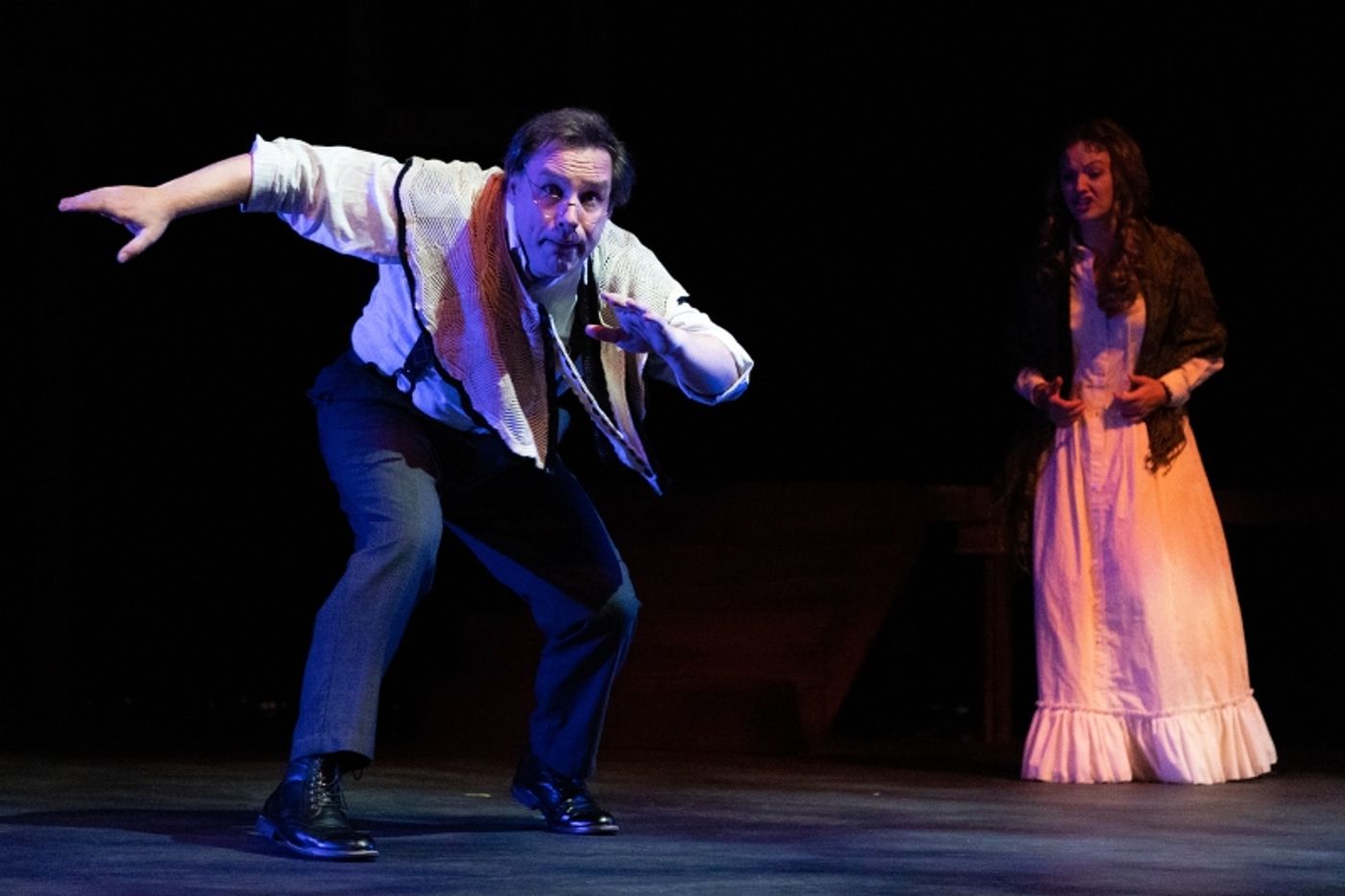
Photography credit: Casey Gardner Ford
On paper, of course, very little actually happens in James's story. However, Hatcher's script and Donadio's direction turn the unknown into the production's most potent weapon. The specter of "What Could Be" lurks around every corner, straddling the line between real and imaginary, innocent and corrupt, even good and evil. Certain unseemly possibilities are alluded to in Quint and Jessell's backstories, and the audience is left to fill in the blanks with whatever stories their minds may weave. Donadio leans into this by having the Governess look off into the distance each time she sees the ghosts, giving the audience the chance to imagine for themselves the horrors that the Governess is seeing. Johnson also uses the sound design to stoke the audience's imaginations, creating mysterious and often unnatural noises that come from offstage as if to forcibly draw our attention toward what we can't see.
Those familiar with The Turn of the Screw will likely know that there are two prominent interpretations of the source text (the truth of which Henry James took to his grave). The fun of each new adaptation of The Turn of the Screw is to see which path the story will take (or if perhaps the adaptation will take a cue from James and keep things ambiguous). While I'll not spoil the ending for you, I will say to Turn of the Screw fanatics that Hatcher's adaptation definitely makes a decisive choice, and if you know the text then it will be rather apparent from the beginning of the play. This hopefully will not diminish your enjoyment of the production, however, as the script still offers plenty of character-rich mysteries to keep the audience engrossed until the very end-a conclusion that is clever, evocative, and above all, haunting.
The Turn of the Screw runs through November 14 at Georgia Ensemble Theatre. Tickets start at $39.
Reader Reviews
Videos

